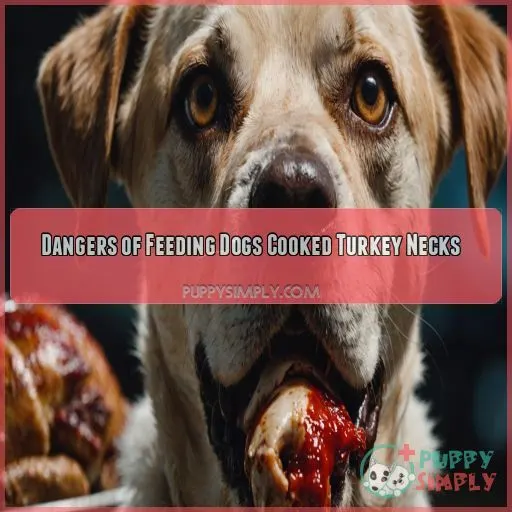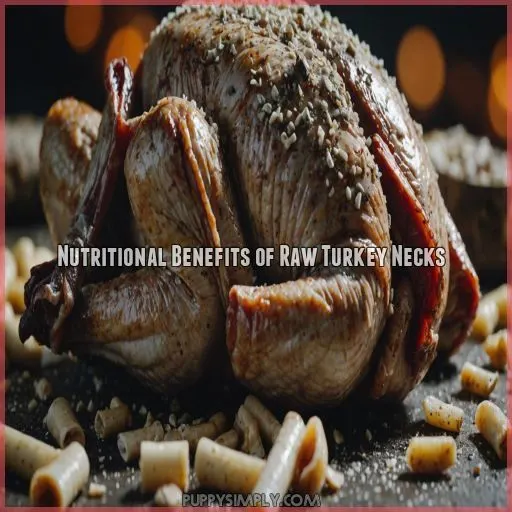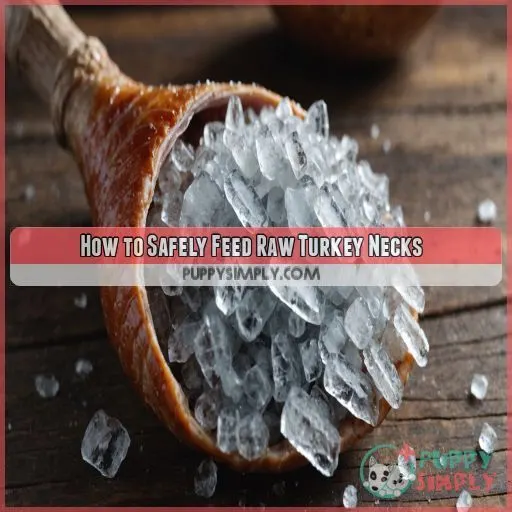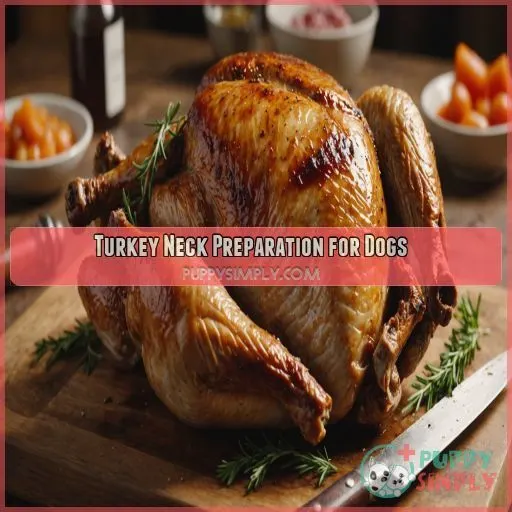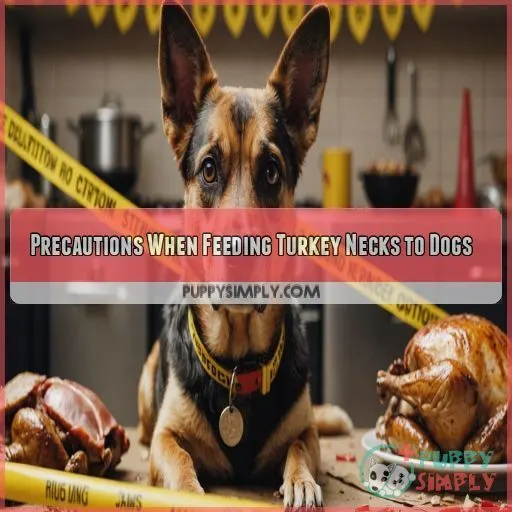This site is supported by our readers. We may earn a commission, at no cost to you, if you purchase through links.
 Can dogs eat turkey necks cooked? Well, you might want to steer clear of that Thanksgiving blunder. Cooked turkey necks can splinter, turning dinner into a risky game of darts aimed right at your pup’s throat or intestines.
Can dogs eat turkey necks cooked? Well, you might want to steer clear of that Thanksgiving blunder. Cooked turkey necks can splinter, turning dinner into a risky game of darts aimed right at your pup’s throat or intestines.
Plus, the cooking process kicks those juicy nutritional benefits like glucosamine and chondroitin right out the window.
Why put your furry friend at risk of choking or a costly vet visit when there are safer alternatives? Stick with raw treats that keep tails wagging and bellies happy.
Curious about these alternatives? We’ve got insights coming up that’ll keep both you and your dog sitting pretty!
Table Of Contents
- Key Takeaways
- Dangers of Feeding Dogs Cooked Turkey Necks
- Safe Alternatives to Cooked Turkey Necks
- Nutritional Benefits of Raw Turkey Necks
- How to Safely Feed Raw Turkey Necks
- Turkey Neck Preparation for Dogs
- Precautions When Feeding Turkey Necks to Dogs
- Frequently Asked Questions (FAQs)
- Is it safe for dogs to eat turkey necks?
- Can dogs eat cooked neck bones?
- What is turkey neck syndrome in dogs?
- Can dogs eat cooked turkey bones?
- Can puppies safely eat turkey necks?
- Are turkey necks suitable for dogs with dental issues?
- How often should turkey necks be given to dogs?
- What size turkey neck is best for large breeds?
- Is turkey neck a good source of calcium?
- Conclusion
Key Takeaways
- You might think you’re giving your dog a treat with cooked turkey necks, but they can turn into a game of dental darts – the bones can splinter and cause serious injuries. It’s a break-the-bank kind of hazard you don’t want to face with a costly and risky vet visit.
- Cooking turkey necks doesn’t just make them dangerous; it also robs them of precious nutritional benefits like glucosamine and chondroitin, which are great for your pup’s joints. It’s like taking the fun out of a rollercoaster – all thrill, no chill.
- Feeding your dog cooked turkey necks is a fast track to digestive disasters like pancreatitis due to their high-fat content. Picture your pooch bingeing on midnight cheesecake – not the party favor you want to bring to the doghouse.
- Instead of cooked necks, opt for safer, tail-wagging alternatives like raw chicken necks, beef bones, or dental chews. Think of them as the superhero squad of dog snacks, providing joy without the drama of sharp bone remnants.
Dangers of Feeding Dogs Cooked Turkey Necks
You might think cooked turkey necks are a tasty treat for your furry friend, but they can actually be a recipe for disaster check out these healthy alternatives. Let
Risk of Splintering and Choking
You might think you’re doing your pup a favor, but cooked turkey necks are a recipe for disaster. When heated, these bones turn into brittle shards that can splinter in your dog’s mouth or throat. It’s like giving them a mouthful of sharp toothpicks – a choking hazard waiting to happen.
Potential for Intestinal Damage
The hidden danger of cooked turkey necks lies in their potential to wreak havoc on your dog’s digestive system. As these bones splinter, they can cause serious intestinal damage. Here’s what you need to know:
- Sharp bone fragments piercing delicate intestinal walls
- Excruciating pain for your furry friend
- Costly emergency vet visits
- Life-threatening internal bleeding
- Heartbreaking outcomes that could’ve been prevented
Increased Risk of Pancreatitis
Feeding your dog cooked turkey necks might sound tempting, but it can lead to pancreatitis due to their high-fat content. Picture your dog binge-eating cheesecake at midnight—yikes! Stick to raw or consult your vet for dog diet guidelines to avoid upset tummies.
Loss of Nutritional Benefits
Cooking turkey necks strips away their nutritional superpowers. The heat damages the precious glucosamine and chondroitin, robbing your pup of joint-supporting benefits. Stick to raw or dehydrated necks to keep your canine companion happy and healthy.
Safe Alternatives to Cooked Turkey Necks
Moving on from the dangers of cooked turkey necks, let’s explore safe alternatives for your furry friend. Ditch the risks with these safer treats:
- Raw chicken necks: Soft enough for easy chewing.
- Beef bones: Opt for size-appropriate, raw options.
- Fish bones: Raw and boneless make them safe.
- Bully sticks: Long-lasting and great for dental health.
- Dental chews: Specifically designed to tackle plaque.
These alternatives keep dog care stress-free while safeguarding your pup’s well-being. Remember, a safe chew equals a happy pup!
Nutritional Benefits of Raw Turkey Necks
If you’re looking to boost your dog’s diet with a delicious treat, raw turkey necks might just be the answer. Packed with protein and essential nutrients like calcium and glucosamine, these crunchy snacks support strong bones and happy joints—your pup will wag its tail in delight!
High Protein Content
Raw turkey necks aren’t just a delicacy for dogs—they’re a protein treasure trove! This protein-rich dog food supports muscle growth and development, especially in puppies and seniors. So, if you’ve ever wondered, "Can dogs eat turkey necks cooked?"—opt for raw instead!
Rich Source of Calcium and Phosphorus
For bone health, raw turkey necks are a savior, packed with calcium and phosphorus. They’re not just for the dog’s enjoyment but serve as dietary supplements. So, next time you’re cooking for dogs, remember the benefits of turkey necks!
Natural Glucosamine and Chondroitin
Turkey necks are a natural powerhouse, providing glucosamine and chondroitin – essential for your pup’s joint health and mobility. These joint-supporting nutrients make turkey necks a fantastic, veterinarian-approved supplement for dogs prone to arthritis.
Essential Fatty Acids
Think of raw turkey necks as nature’s omega-3 benefits central! These fatty acid sources can work wonders for your dog’s skin and coat, promoting joint health, too. Unlike commercial dog food brands, they’re the real McCoy—no additives or funky fillers, just wholesome goodness.
How to Safely Feed Raw Turkey Necks
Feeding raw turkey necks to your dog can be a tasty and nutritious treat, but you’ll want to avoid the headaches of improper preparation. Keeping these simple tips in mind will make sure your pup’s snack time remains joyful and safe, rather than a trip to the vet.
Proper Storage and Handling
Proper storage and handling are key when feeding raw turkey necks. Refrigerate or freeze them promptly to maintain freshness and prevent bacterial growth. Thaw in the fridge, not at room temperature. Wash your hands and surfaces thoroughly before and after handling to make sure everything is clean. Safety first, pup parents!
Appropriate Serving Sizes
When it comes to feeding raw turkey necks, portion control is key. Consider your dog’s weight, age, and breed size:
- Small breed dogs? Half to one neck per week will do.
- Medium-sized furballs? One neck twice a week should suffice.
- Big boys (and girls)? Aim for two to three necks weekly.
Finding the right balance enhances safety and satisfaction!
Supervision During Feeding
When giving your pup raw turkey necks, it’s like being a lifeguard at the doggie pool. Keep an eye out for choking hazards and signs of distress. Stay vigilant during chew time.
| Supervision Tips | What to Watch For |
|---|---|
| Safe environment | Dog behavior changes |
| Keep calm | Signs of distress |
| Be ready to step in | Swallowing difficulties |
Always make sure safety comes first!
Turkey Neck Preparation for Dogs
If you’re thinking about giving your furry friend turkey necks, creativity is key to keeping them both safe and satisfied. From freeze-drying to grinding them up for easier digestion, you’ll discover plenty of ways to treat your pup without risking their health.
Freeze-Drying Process
Freeze-drying turkey necks? It’s like turning them into safe, long-lasting chew toys. This method preserves nutrients but requires special equipment and time. The major plus here is safety—no splintering bones to ruin playtime! Just make sure you store them properly for ultimate freshness.
Dehydration Methods
Dehydrating turkey necks at home is a breeze – just pop them in the oven or a dedicated dehydrator. Adjust time and temp to achieve the perfect chewy texture. Food safety first, pals!
Grinding for Easier Digestion
Grinding turkey necks helps make digestion easier for your furry friend, turning bone into a manageable texture. Think of it as pre-chewing their meal—less chewing time, less risk! Fine grind aids digestion and safety, reducing size, not the benefits. Consider other chew options, too!
Incorporating Into Homemade Dog Food
Switching gears from grinding, why not mix turkey necks into homemade dog food? With turkey neck recipes, you can fine-tune ingredient ratios for nutritional balance. Just remember, a steady feeding schedule will keep tails wagging and peace of mind intact.
Precautions When Feeding Turkey Necks to Dogs
When giving your furry friend turkey necks, it’s important to tailor the treats to their size and health. Don’t worry, keeping an eye on them while they gnaw is as simple as supervising your teenager trying out a new TikTok dance!
Breed and Size Considerations
For turkey necks, size matters! Smaller breeds face a higher choking risk due to their jaw strength and neck size. Make sure your pup’s chewing ability matches the neck size. Remember, it’s not a "one-size-fits-all" snack! Keep ’em safe.
Age and Dental Health Factors
While considering turkey necks for different breeds, keep in mind your dog’s age and dental health. Senior dogs might struggle with tooth loss, while puppies have delicate teeth. Here’s what to watch for:
- Chewing ability
- Dental problems
- Tooth loss
Existing Health Conditions
Just like checking age or dental health, don’t overlook existing health conditions before giving your pooch turkey necks. If Spot’s fighting issues like kidney disease, joint pain, or pancreatitis, or battles allergies or digestive problems, it’s best to steer clear and keep things safe.
Monitoring for Adverse Reactions
When feeding turkey necks, keep a close eye on your pup. Watch for signs of upset, like vomiting, diarrhea, or allergic reactions. If you notice changes in energy or appetite, stop feeding and consult your vet right away. Your dog’s safety comes first!
- Signs of upset
- Vomiting
- Diarrhea
- Allergic reactions
Frequently Asked Questions (FAQs)
Is it safe for dogs to eat turkey necks?
Dogs can enjoy turkey necks as a nutritious treat for bone health. Just remember, serve them raw or dehydrated. Supervision’s key since cooked bones can splinter and pose a hazard. Keep it safe and tasty .
Can dogs eat cooked neck bones?
No, avoid cooked neck bones for dogs. They’re a recipe for disaster—like trying to chew glass. Cooked bones splinter easily and can harm your dog’s digestive tract. Stick with raw or dehydrated options for safe chewing.
What is turkey neck syndrome in dogs?
Imagine this: Your dog’s once-sleek neck starts sagging like an old curtain. That’s turkey neck syndrome in a nutshell! It’s often due to aging or weight loss, causing loose skin, but doesn’t usually harm their health.
Can dogs eat cooked turkey bones?
You should never give your dog cooked turkey bones. They’re likely to splinter and cause serious internal injuries or blockages. Imagine a bone turning into dangerous shrapnel inside your pup! Always opt for safer alternatives.
Can puppies safely eat turkey necks?
Think of turkey necks as a junior chew’s gym. Puppies can enjoy raw, freeze-dried, or dehydrated turkey necks safely, but you’ve got to ease them in slowly and always keep a watchful eye on your playful pup.
Are turkey necks suitable for dogs with dental issues?
If your dog has dental issues, approach turkey necks cautiously. While they offer chewing benefits, they might be too tough. Consider consulting your vet, as it’s like asking if a brittle cookie suits someone with weak teeth.
How often should turkey necks be given to dogs?
Depending on your dog’s size, offer 1/2 to 1 turkey neck 2-3 times per week as a chew. Start slow and monitor your pup – these nutritious necks are a treat, not a meal replacement. [/ANSWER]
What size turkey neck is best for large breeds?
For large breeds, a whole turkey neck is ideal. It’s a satisfying chew that provides nutrients and dental benefits. Think of it like your dog’s crunchy, flavorful "protein bar" that also cleans teeth and exercises muscles.
Is turkey neck a good source of calcium?
Turkey necks are a fantastic calcium source, akin to striking nutritional gold for your dog. They’re packed with essential minerals, supporting healthy bones and teeth. Just make sure they’re raw, freeze-dried, or dehydrated for safe enjoyment.
Conclusion
You’re at Thanksgiving and your dog is giving you those irresistible puppy eyes.
You might wonder, "Can dogs eat turkey necks cooked?"
But hold your gravy! Cooked turkey necks can splinter and pose serious health risks.
Stick with safer, raw options rich in nutrients like glucosamine.
They’ll keep your dog’s tail wagging and nibble worries at bay.

